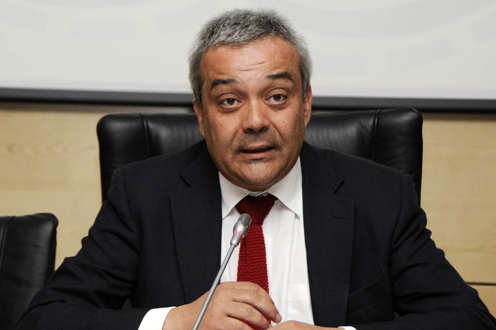30th Telecommunications and the Digital Economy Encounter in Santander
Spain now has the most extensive fibre-to-the-home network in Europe with 22.5 million access points installed
News - 2016.9.5
On Monday morning, Víctor Calvo-Sotelo, State Secretary for Telecommunications and the Information Society at the Ministry of Industry, Energy and Tourism, opened the 30th Telecommunications and the Digital Economy Encounter, held at the International Menéndez Pelayo University in Santander. The event was organised by the Spanish Association of Electronics, Information Technology, Telecommunications and Digital Content Companies (Spanish acronym: AMETIC) and Fundación Telefónica. This year the meeting's slogan was Constructing a Digital Spain.
After some introductory words of welcome from César Nombela, the Vice-Chancellor of the International Menéndez Pelayo University (UIMP), it was the turn of José Manuel de Riva, the President of AMETIC, and Emilio Gilolmo, Vice-President of Fundación Telefónica. Their words were followed by the opening address, which was given by the State Secretary for Communications and the Information Society, Víctor Calvo-Sotelo.
The State Secretary began his address highlighting the hard work being carried out over recent years and pointed out that "the digital transformation of our country is moving forward at a good pace." Here he recalled Spain's fourth place on the Digital Economy and Society Index, an indicator used by the European Commission for Member States. Spain posted the fourth highest growth in this respect over the last year.
Victor Calvo-Sotelo's speech focused on the actions taken during the Government's last term in office on questions of connectivity, the information society and smart cities. He pointed out that "to continue to make progress in the process of creating this digital society there has to be a return to normality in the political situation." He also highlighted the enormous challenges faced by the sector for the coming years and stressed that Spain's objective is to be one the digital leaders.
Connectivity
The State Secretary pointed to the passing of the new General Telecommunications Act, "whose general approval allows us to offer the necessary highly stable regulatory environment" and to the aid given to extend broadband cover to unprofitable zones, offering cover to nearly 3.5 million homes.
He highlighted that these public initiatives have underpinned efforts from private investors, thanks to which Spain now has the most extensive fibre optic network in Europe with 22.5 million points of access installed, compared with 15.3 million a year ago and 1.6 million in 2012.
13.8% of Internet connections in Spain are now more than 100 Mbps and the mobile broadband penetration rate is 80%. Víctor Calvo-Sotelo explained that "connectivity is the cornerstone on which a number of connectivity programmes are being developed that are contributing to the sustainable development of our country. Among them are the Smart Cities Plan and the Connected Schools Initiative."
The Information Society and Smart Cities
While in the capital of Cantabria, the State Secretary highlighted the results obtained so far by the National Smart Cities Plan: a budget of 145 million euros, 25 national projects in a sector that is growing at a rate of 20% per year and in which Spain is a model for countries around the world, as recently recognised by the International Telecommunication Union (ITU).
He indicated that "this year a budget of 80 million euros has been allocated to the traditional line of aid for R&D+i in the Internet and Communication Technologies (ICT), including the Connected Industry 4.0 as one of its priority issues." His speech also mentioned the call for aid programmes implementing cloud computing and the Language Technology Promotion plan.
Domestic challenges and a Single Digital Market
Víctor Calvo-Sotelo closed the opening event of the 30th Telecommunications Encounter by outlining the five challenges faced by Spain: universal cover by high-speed broadband; security of the networks and the services offered on them; boosting the adoption of the ICT; more digital training; and fostering entrepreneurship.
To conclude, he mentioned the Single Digital Market, whose creation "is only the means to increase Europe's weight in the world. "A vibrant ecosystem has to emerge on our continent based on new technologies that rival and compete with the two major markets to our east and to our west, thereby positioning Europe and our country on the digital world map," he concluded.





